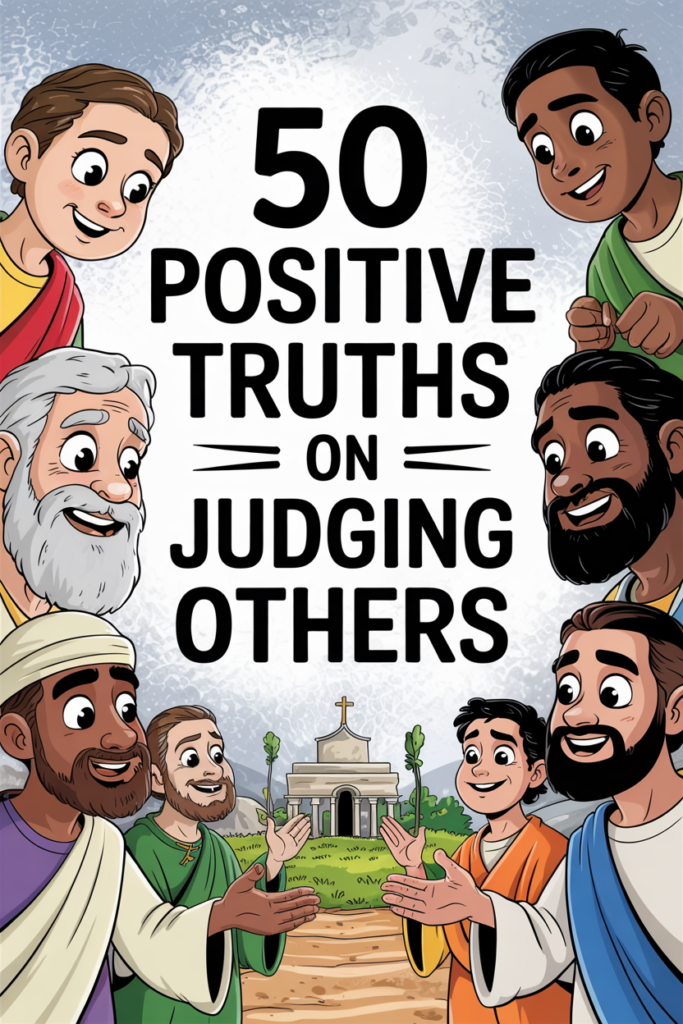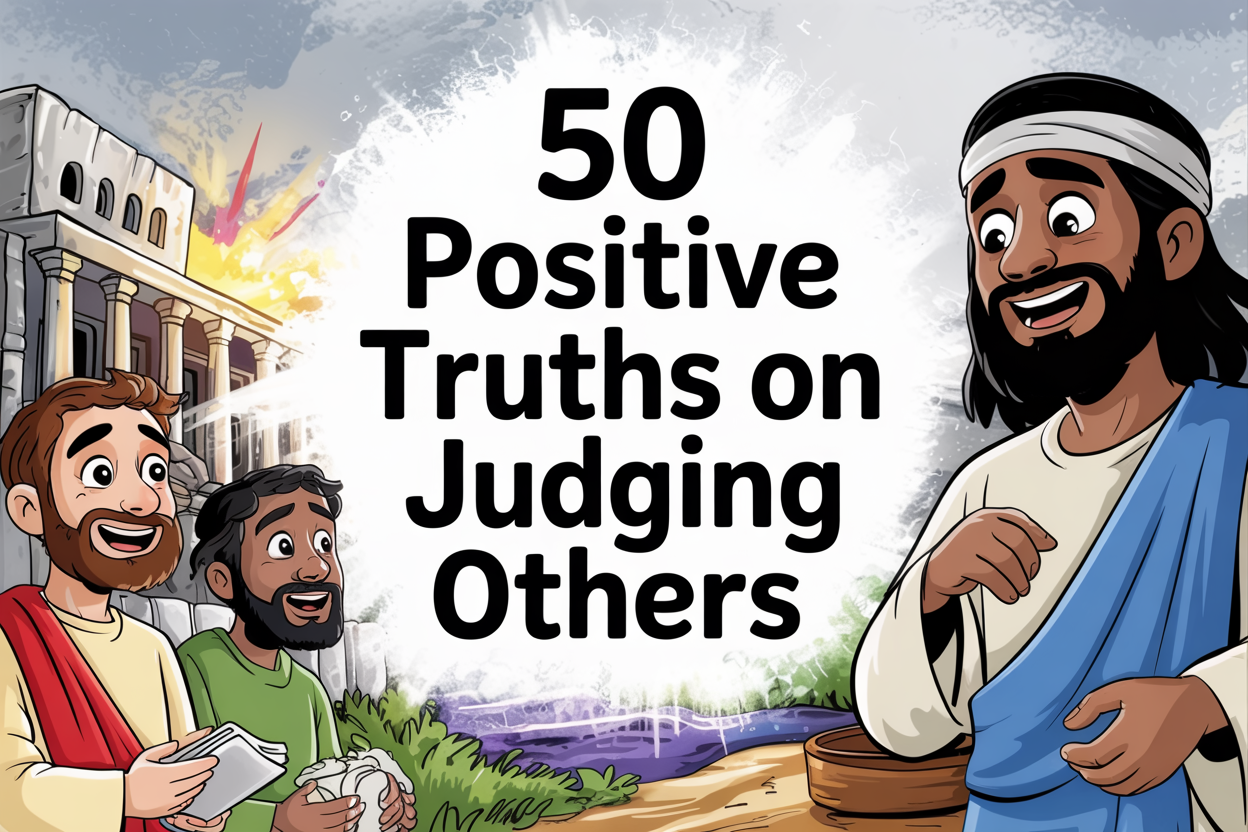Have you ever caught yourself judging someone without really knowing their story? Maybe you’ve felt that sting when others jump to conclusions about you. It’s tough territory for all of us, and it can be confusing when the Bible teaches us both not to judge and yet to discern right from wrong.
This list of bullet points aims to clear up that tension by showing how to treat people with compassion while still standing for truth. If you’ve wanted a healthier approach to conflict, mistakes, and accountability, you’ll find encouragement here. Let’s see how biblical judgment can look more like loving guidance than harsh condemnation.

God’s Heart for Judgment and Mercy
- God looks on the heart rather than appearances, reminding us to judge righteously (1 Samuel 16:7).
- The Lord desires mercy and compassion alongside truth, uniting justice with kindness (Zechariah 7:9).
- He is the ultimate judge who always does right, freeing us from carrying that burden ourselves (Genesis 18:25).
- His throne is established in justice and fairness, offering security to those who trust Him (Psalm 89:14).
- He calls us to correct one another gently, showing His heart to restore the fallen (Galatians 6:1).
- Righteous judgment in Scripture reflects God’s character of holiness and mercy (Psalm 9:8).
- The Father’s judgment is perfect, yet He delights in exercising lovingkindness toward those who repent (Jeremiah 9:24).
- He extends forgiveness that triumphs over condemnation, guiding us to offer grace in return (James 2:13).
- His law of love was always about protecting people, never about harsh, unloving punishment (Leviticus 19:18).
- Every act of godly judgment points back to His desire to heal and bless His people (Isaiah 1:18).
Walking in Humility
- We remember we too will be judged by the same measure we use on others (Matthew 7:2).
- It helps to first remove the beam in our own eye so we can see clearly to assist others (Matthew 7:5).
- God opposes pride but lifts up the humble, prompting us to approach others gently (James 4:6).
- Self-examination and repentance keep our hearts soft and prevent self-righteousness (1 Corinthians 11:31).
- True humility acknowledges we all stumble, drawing us closer in understanding (James 3:2).
- Confessing our faults to one another fosters mutual grace and freedom from hidden shame (James 5:16).
- Considering our weaknesses keeps us from judging anyone’s struggles hastily (Galatians 6:2-3).
- Prideful judging leads to downfall, but humility leads to exaltation by God (Proverbs 16:18).
- We stand level at the foot of the cross, where grace covers all who believe (Romans 3:23-24).
- Recognizing our own need for mercy allows us to approach others with compassion (Ephesians 4:32).
Blessings of a Merciful Spirit
- Showing mercy to others invites God’s mercy in our own lives (Matthew 5:7).
- Those who rebuke sin kindly may see a fruitful blessing on their community (Proverbs 24:25).
- Generous grace toward others often brings stronger, healthier relationships (Luke 6:37-38).
- A loving approach restores people to wholeness, reminding us sin does not define us forever (John 8:11).
- Godly kindness nurtures unity and warmth in the church body (Colossians 3:12-13).
- Pursuing peace in how we handle conflict brings lasting reassurance of God’s favor (Romans 12:18).
- Speaking truth in love builds trust and draws others closer to God’s healing presence (Ephesians 4:15).
- Offering forgiveness instead of judgment opens doors for ongoing transformation (Luke 17:3-4).
- Being quick to listen and slow to speak prevents misunderstandings and fosters gentleness (James 1:19).
- Obeying God’s call to love over condemnation liberates us from bitterness (1 John 4:11).
Examples of Righteous Judgment
- Nathan confronted King David in a way that led David to genuine repentance (2 Samuel 12:7-9).
- Joseph refused vengeance on his brothers, choosing forgiveness and God’s redemptive plan (Genesis 50:19-20).
- Jesus defended the woman taken in adultery, yet urged her to leave sin behind (John 8:10-11).
- Paul corrected the Corinthian church about tolerating immorality, aiming for their spiritual health (1 Corinthians 5:1-2).
- James warned against favoritism and taught believers to judge without partiality (James 2:1).
- The prophets spoke God’s truth to correct Israel, yet always held out hope for restoration (Jeremiah 31:18-20).
- Moses appointed judges who were told to execute true judgment and show no partiality (Deuteronomy 1:16-17).
- Jesus taught that when we see someone straying, we should go to them privately to regain a brother (Matthew 18:15).
- Samuel anointed David after discerning God’s choice, ignoring outward status (1 Samuel 16:12-13).
- Jehoshaphat commanded judges to remember they serve the Lord, calling for honesty and fear of God (2 Chronicles 19:6-7).
Practical Encouragement for Us Today
- Pausing to pray before judging someone can open our hearts to a wiser response (Philippians 4:6-7).
- The Holy Spirit offers guidance in discerning truth from appearances (John 16:13).
- Practicing patience and waiting to hear all sides promotes genuine fairness (Proverbs 18:13).
- We can entrust ultimate justice to God, who sees beyond what we can see (Romans 12:19).
- Building each other up in love prevents harmful gossip or slander (Ephesians 4:29).
- Checking our motive ensures we speak for someone’s good, not to elevate ourselves (Philippians 2:3).
- We find unity by embracing both truth and mercy, reflecting the heart of Jesus (John 1:14).
- Walking in the Spirit nurtures a heart that seeks restoration over condemnation (Galatians 5:16).
- Keeping our eyes on Christ frees us from trying to control or judge every situation (Hebrews 12:2).
- Loving our neighbor as ourselves motivates us to treat them with understanding and grace (Mark 12:31)
Affiliate Disclosure: "As an Amazon Associate I earn from qualifying purchases made from links in this post. We are a participant in the Amazon Services LLC Associates Program, an affiliate advertising program designed to provide a means for us to earn fees by linking to Amazon.com."

